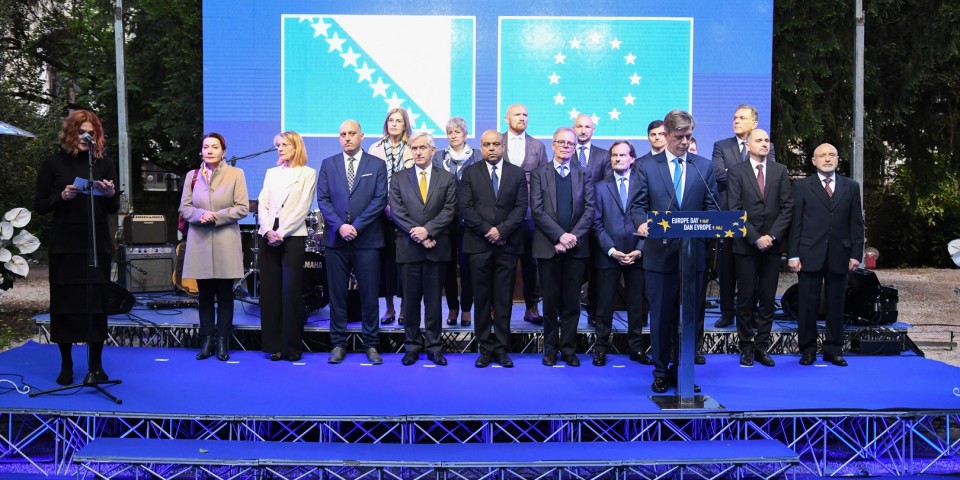
10. May 2019.
Speech by EU Ambassador Lars-Gunnar Wigemark on Europe Day 2019
Excellencies, Honoured Guests, Ladies and Gentlemen! On behalf of the European Union and our Member States, let me welcome all of you to this year’s Europe Day celebration. I am happy to see so m...
Excellencies, Honoured Guests, Ladies and Gentlemen!
- On behalf of the European Union and our Member States, let me welcome all of you to this year’s Europe Day celebration.
- I am happy to see so many colleagues and friends here from all over the country. And a special welcome to those of you who have travelled far – from Bihac, Mostar, Banja Luka – to join us here in Sarajevo this evening.
- Four years as EU representative in Bosnia and Herzegovina has at least taught me one thing: People are not interested to listen to long speeches on festive occasions such as today. It will not be easy, but let me try to be brief, even though there is much that needs to be said.
- The National Museum is not only beautiful but an appropriate venue to celebrate Europe Day. Like the European Union, we are reminded tonight of the richness of Bosnia and Herzegovina in terms of its cultural, ethnic and religious diversity and heritage.
- Being European means accepting differences and to be tolerant towards people of other ethnic, political, religious and cultural orientations. Our common European history is what binds us together. It should not separate us. And as Europeans, we should constantly remind ourselves not to repeat mistakes and tragedies of the past.
- While it may not be healthy to dwell on conflicts of the past, we should also not forget what lies at the heart of the European Union: A commitment to peace and security for all European citizens based on mutual respect for our human rights and a willingness to engage in reconciliation and forgive our historical enemies.
- When the European Union speaks about the need for reconciliation and overcoming past conflicts, we speak on the basis of our own experience. We speak about the need for a common interpretation of history and we reject attempts to revise historical facts and figures.
- When the history of the present period is written, it will likely include several chapters on how this country, as well as the entire region, became members of the European Union. And I look forward to reading about it.
- But the transformation needed for BiH to enter the European Union will not be automatic. It remains a matter of choice, demanding many steps and decisions. The speed of EU accession is determined by how quickly Bosnia and Herzegovina is able to adjust and start to implement EU rules, standards and regulations.
- No magic wand or glib political statements can replace the hard work and heavy lifting by political leaders and civil servants necessary to change conditions that are not in line with EU principles and standards. Civil society, including the business community, non-governmental organization and media will also need to engage much more than has so far been the case.
- Here I would like to take a moment and thank all our colleagues and partners at different levels of administration in BiH for their hard work and dedication to prepare the answers to the Questionnaire, participating in the work many committees under the Stabilization and Association Agreement and preparing legislative initiatives in line with the EU acquis.
- Starting with the Directorate for Integration and many State and Entity level Ministries and Agencies, there are hundreds, if not thousands, of people involved with the EU integration process on a daily basis. Cantonal and local governments are becoming increasingly engaged as well and this summer the EU Office will reach out this summer to all ten Cantonal governments to discuss their role in the integration process. The new government in Republika Srpska has already taken steps to strengthen its capacity to handle EU affairs and the Federation needs to do the same.
- I would also like to thank our many civil society partners who are acting as watch dogs over the authorities behaviour. An independent and dynamic civil society is necessary for the transformation of BiH and alignment with EU standards.
- The EU and our Member States stand ready to support all institutions working on integration. Many so-called twinning projects, peer reviews and TAIEX projects are already under the way, involving hundreds of experts from our Member States. But more is needed. And to this end, we will double our IPA grant financial assistance to 80 million euro per year in the coming period.
- In addition the European Investment Bank and other EU institutions will continue to provide hundreds of millions of euros in credits at the lowest possible interest rates for everything from new hospitals and waste water treatment to environmentally sound transport and energy infrastructure.
- Due to the fact that there are now country wide strategies in areas such as rural development, environment, energy and transport, we are increasing our assistance in these sectors as well. But for this support to be effective there must be a clear understanding of what the needs are – and only you as our partners can provide us with that.
- Looking back at the past twelve months, there have been ups and downs on BiH’s journey to the EU. Needless to say, there was a slow down before and after the general elections in October. And some essential government structures are still not in place.
- The migration crisis challenged authorities at all levels over the past year. And as EU we will continue to support BiH to strengthen its border management and migration policies. Another 13 million euro will be spent in the coming months on top of almost ten million euros allocated in 2018.
- Despite these challenges, there is still momentum in the EU integration process and all political actors see accession to the EU as a common objective. According to a recent opinion poll, 75 percent of BiH citizens wish to join the European Union.
- It is thus no coincidence that, at their first session in December, the newly elected members of the Presidency recognized the importance of EU integration as the main strategic goal for the country and underlined their commitment to push for economic and social reforms, strengthening the rule of law, fight against corruption, and support public sector reforms. And it was only natural that the first joint visit all three Presidency members undertook in January went to the EU headquarters in Brussels.
- The consensus on the need to move forward on EU accession should be a pillar for the new governments at all levels. Parties elected to parliaments at both State and Entity level agree on one thing: the need to continue to move towards the EU. These words now need to be translated into actions. Voters would like their political leaders to implement the reforms necessary to move the country closer to EU and improve living standards without any further delays.
- The European Commission’s Opinion on BiH’s membership application is expected to be made public soon. It will for the first time provide a comprehensive blue print for the steps needed to move closer to the EU and what is necessary for BiH to in order to become a member European Union. The Opinion will in itself be a landmark on the road to the EU.
- Let’s be clear. The opinion is not a decision whether or not to grant BiH candidacy status. It is an in depth analysis of the extent to which this country meets EU standards based on the answers to almost 4.000 questions posed by the Commission as well as many other sources of information, including assessment by experts from all 28 Member States in so-called peer reviews.
- Once it is available, the Opinion will first be considered by the 28 Member States of the European Union, a process that is likely to take several months since our Member States will want discuss among themselves which steps they would like recommend for BiH to take first.
- In the meantime, it is essential that BiH continues to move forward and demonstrates an ability to handle EU requirements. Obviously, it is necessary to implement the election results from last October’s elections and establishing new governments at all levels since a functioning democracy is a fundamental criterion for any country wishing to join the EU. It is difficult to envisage the EU Council deciding unanimously to move forward with BiH without a duly elected Council of Minister being in office.
- In a few weeks, EU citizens will elect a new European Parliament and towards the end of this year a newly appointed European Commission will take office. The results of these European elections will, of course, also influence the position taken by the European Parliament and Member States. But when it comes to the enlargement policy and the EU’s approach towards Bosnia and Herzegovina, I would not expect too many changes. The Western Balkans Strategy presented a year ago by the European Commission and the commitments undertaken at the Sofia Summit and elsewhere cannot be overlooked for the sake of political expediency.
- The EU’s policies towards BiH as well as other countries seeking membership in the European Union are also regulated in our own treaties and cannot be changed without the consent of all Member States.
- Finally, I would also like to take the occasion to tone down the talk about the EU being in crisis. On the contrary, if the European Union did not exist already, it would have to be re-invented. More than ever before, European countries need to work together to face attacks and threats against fundamental principles from freedom of speech to freedom of trade.
- Perhaps more than anyone else, the EU is furthermore taking action to protect our common environment, in particular the visible effects of climate change. The latest alerts by the United Nations are worrisome and it may already be too late to save entire ecosystems and countries like BiH with unique old forests, rivers and mountains are very vulnerable.
- One third of the EU acquis concern the environmental standards from clean air to recycling and the use natural methods such as permaculture instead of fertilizers. By integrating with the EU, the air you breathe air here in Sarajevo and elsewhere will literally have to improve.
- That is not to say that the EU has a solution for everything and that we should remain impervious to changing environmental, political and security conditions around us. Since being founded in Rome more than 60 years ago, the strength of the EU has been its ability to respond to changing circumstances both inside and outside Europe by adjusting its policies and legal framework.
- Symbolically today on Europe Day, a Summit organised by the Romanian Presidency of the EU Council is taking in place in Sibiu, Transylvania, where EU leaders have gathered to discuss the future of Europe. A future that will also include Bosnia and Herzegovina.
- The EU you will join may not look exactly as it does today. But I am convinced will an even more resilient and stronger Union than anything we have witnessed so far.
- Thank you for your attention!
